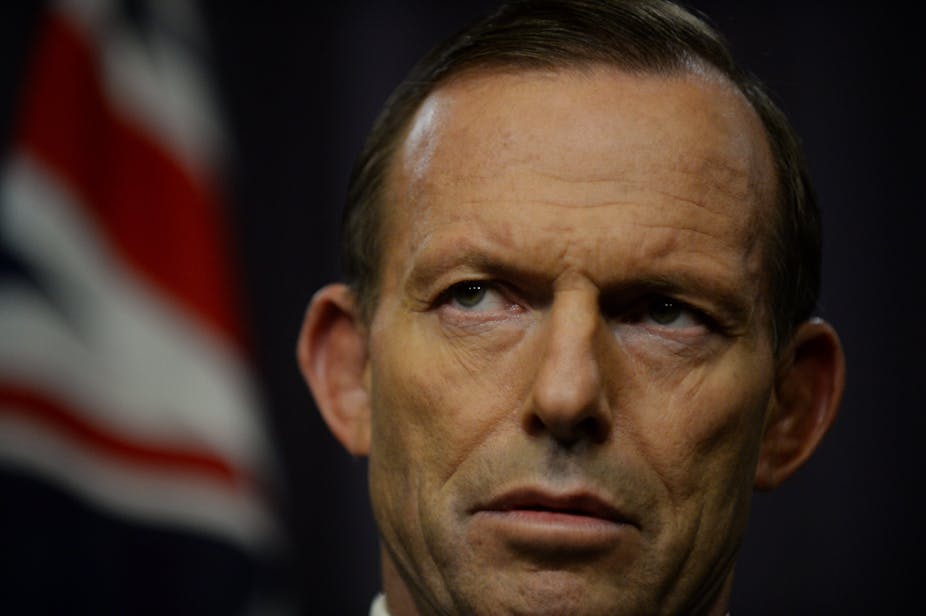Age pensioners will be hit in three years’ time with slower increases and a crackdown on eligibility, Tony Abbott flagged tonight.
To keep his pre-election promise, there would be no change to the age pension this term.
But he said there were other social security benefits “where indexation arrangements and eligibility thresholds should be adjusted now so that our social safety net is more sustainable for the long term”.
These benefits – which he didn’t spell out – would not be less tomorrow than today but the rate of increase would be slower.
It is understood that the Family Tax Benefit system will be tightened as well as arrangements for other payments.
Speaking to the Sydney Institute, Abbott held out the prospect of tax cuts – but not this term. “The changes in this budget will make personal tax cuts much more likely in four or five years’ time,” he said.
With speculation about a deficit levy on higher-income earners, Abbott said “everyone” would feel the budget pain “including high-income earners such as members of parliament”.
Talk of a levy - on which it is believed no decision has yet been made - has sparked strong business opposition and would be seen to flout Abbott’s pledge not to bring in new taxes.
“A temporary levy … is not a solution to the fiscal challenge and could let governments off the hook on the structural steps needed to fix the budget properly,” Business Council of Australia Chief Executive Jennifer Westacott said today.
Abbott repeated his election promise of no overall cut to health but pointed to a co-payment for doctors visits. There would be “more price signals in the system with a strong safety net because ‘free’ services to patients are certainly not free to taxpayers”.
He also said some unspecified one-off payments “should never have been introduced and are unaffordable at this time”.
The Prime Minister said he knew most families were doing it tough, including many with above-average incomes but heavy commitments.
“Not for a second would I label families as ‘rich’ just because they are earning $100,000 a year. A teacher married to a part-time shop assistant with children to feed, clothe and educate is certainly not rich, especially paying a capital city mortgage.
"But the best way to help families on $100,000 a year is long-term tax relief and more business and job opportunities, not social security hand-outs.”
Abbott’s announcement of some detail about the age pension changes – which are expected to include a rise in the age of eligibility to 70 in the longer term - is partly to stop alarm among seniors.
He said that with more than 1000 people becoming eligible for the age pension every week, “long-term reform is essential and unavoidable”.
“To keep our commitments, there will be no changes to the pension during this term of parliament, but there should be changes to indexation arrangements and eligibility thresholds in three years’ time,” he said.
“But I want to assure vulnerable people that the age pension won’t be less tomorrow than it is today and that people turning 65 tomorrow are certainly not going to have to wait five years to retire,” he said.
His government’s first budget “is about shifting our focus from entitlement to enterprise, from welfare to work, from hand-out to hand-up, from our own short-term anxieties to our nation’s long-term opportunities”.
On budget night there would not be many without a potential grumble, “but involving everyone in repaying Labor’s spending binge is the only way to be fair”.
Universities’ funding would shift but they would have much more freedom to innovate; training programs would focus less on trainer priorities and more on employer needs.
School leavers would be learning or earning, not becoming accustomed to unemployment.
Business programs would involve far less bureaucracy.
“Starting in this budget, for older people, people with disabilities and women with young children, our aim is to maximise everyone’s ability to participate in the economy. It’s about driving change, but even more about empowering choice.”
The budget - which has a four-year forward estimate period - would “bring us close to surplus” and on track for a “strong surplus” within a decade, Abbott said.
He admitted the budget carried political risks for the government. Opposition Leader Bill Shorten said there was “no bigger broken promise than saying to pensioners before the election that your pensions are safe, then after the election starting to scare Australia’s pensioners by talking about messing around with aspects of the pension”.
Shorten said that the “best reform you could do to help release pressure on the budget is to lift compulsory superannuation from 9.25% to 12% over the next number of years”.

